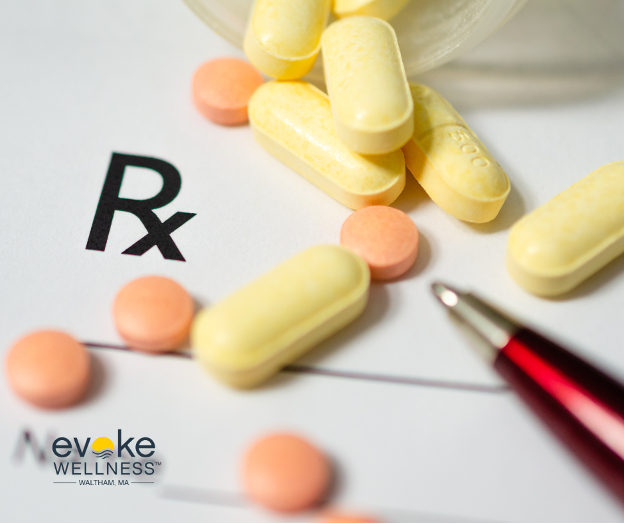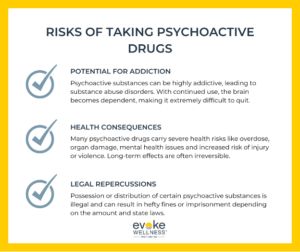Navigating recovery from addiction to psychoactive drugs requires comprehensive, evidence-based treatment. As psychoactive drug use continues to rise, effective therapies prove critical for successful rehabilitation. This article explores proven techniques to treat dependence on substances like opioids, stimulants, and depressants. You’ll learn about substance abuse programs utilizing cognitive behavioral therapy, dialectical behavioral therapy, and holistic practices. Statistics and studies demonstrate these modalities effectively address underlying causes of addiction and build healthy coping strategies. With compassionate support and proper treatment, those struggling with prescription or illicit drug abuse can overcome addiction’s grasp. Embark on the journey of recovery with research-backed therapies promoting lasting wellness.
Together, let’s embrace the journey to recovery and the promise of a new beginning. Call us at (833) 287-7223 today or reach out online.
Overview of Psychoactive Drugs
Psychoactive drugs can profoundly impact the brain’s function, resulting in altered consciousness, moods, thoughts and behaviors. According to recent studies, over 31 million Americans struggle with substance abuse disorders involving psychoactive substances.
Types of Psychoactive Drugs
- Depressants (e.g. alcohol, opioids)
- Stimulants (e.g. cocaine, methamphetamines)
- Hallucinogens (e.g. LSD, psilocybin mushrooms)
- Dissociative anesthetics (e.g. ketamine, PCP)
Dangers of Psychoactive Drug Abuse
Prolonged psychoactive drug use can lead to addiction, overdose, mental health issues and long-term cognitive impairment. Seeking professional rehab is crucial for overcoming substance abuse disorders.
What Makes a Drug Psychoactive?
Brain Effects
Psychoactive drugs alter mental processes by impacting the central nervous system. They interact with neurotransmitters and receptor systems in the brain, influencing mood, perception, and behavior. According to a study, sugar consumption triggers dopamine release in reward pathways, inducing psychoactive effects similar to drugs.
Common Traits
Psychoactive substances share traits like causing withdrawal symptoms upon discontinuation, triggering dependence and addiction, and activating brain regions involved in pleasure and reward. Benzodiazepines exert psychoactive effects by enhancing GABA neurotransmission, inducing anxiolytic and sedative states.
Therapeutic Use
While some psychoactive drugs have therapeutic benefits when used as prescribed, many carry risks of abuse and addiction. Flumazenil can reverse benzodiazepine overdoses by blocking their effects on GABA receptors. Psychoactive drugs alter consciousness, making them useful clinically but also susceptible to misuse.
Types of Psychoactive Drugs
Stimulants
- Amphetamines (e.g. Adderall)
- Cocaine
- Methamphetamine (meth)
Depressants
- Alcohol
- Benzodiazepines (e.g. Xanax)
- Barbiturates
Opioids
- Heroin
- Prescription painkillers (e.g. OxyContin)
- Synthetic opioids (e.g. fentanyl)
Hallucinogens
- LSD
- Psilocybin mushrooms
- MDMA (ecstasy)
Psychoactive substances affect the brain, altering mood, perception, and behavior. Some are legally available by prescription for medical use but have high potential for abuse and addiction when misused.
Examples of Psychoactive Drugs
Psychoactive drugs are substances that affect the mind and mental processes. Some common examples include:
Benzodiazepines
- Benzodiazepines like Xanax and Klonopin are prescribed for anxiety, seizures, and sleep disorders. They work by enhancing the effects of GABA, a calming neurotransmitter in the brain.
- While effective for short-term use, long-term benzodiazepine use can lead to dependence and withdrawal symptoms upon discontinuation. Prolonged misuse poses risks like overdose due to their effects on the central nervous system.
Stimulants
- Drugs like cocaine, methamphetamine, and prescription stimulants are psychoactive substances that increase energy, focus, and euphoria by impacting dopamine levels.
- Stimulant addiction is linked to cardiovascular problems, psychosis, and other mental health issues with chronic use.
Substance Abuse Treatment
Evidence-Based Treatment Programs
At Evoke Wellness, our substance abuse treatment programs employ evidence-based therapies tailored to each individual’s needs. Our comprehensive offerings include drug addiction treatment, alcohol addiction treatment, heroin addiction treatment, cocaine addiction treatment, prescription drug addiction treatment, and opioid addiction treatment.
Psychotherapy Approaches
We integrate cognitive behavioral therapy and dialectical behavior therapy to address the psychological aspects of addiction. These proven psychotherapies help modify harmful thought patterns and behaviors, fostering emotional regulation skills.
Holistic Healing
Our holistic addiction therapy complements clinical treatments. Mindfulness practices, yoga, art therapy, and other mind-body modalities support whole-person healing – nurturing the physical, mental, emotional and spiritual dimensions of recovery.
Drug Addiction Treatment Program
Evidence-Based Therapies
Evoke Wellness offers a comprehensive drug addiction treatment program utilizing evidence-based therapies. Cognitive Behavioral Therapy (CBT) helps patients identify and change negative thought patterns contributing to addiction. Dialectical Behavior Therapy (DBT) teaches mindfulness, emotion regulation, and distress tolerance skills.
Holistic Approach
Holistic treatments like mindfulness therapy, yoga, and nutritional counseling complement traditional therapies. This whole-person approach addresses the physical, psychological, social, and spiritual aspects of addiction recovery.
Personalized Care
Treatment plans are personalized based on individual needs. For prescription drug addiction, medically-assisted detox helps manage withdrawal safely before transitioning to therapies addressing root causes. Evoke provides inpatient, outpatient, and aftercare programs for lasting sobriety.
Prescription Drug Addiction Treatment
Comprehensive Therapies
An effective prescription drug addiction treatment plan combines evidence-based psychotherapy with medication-assisted treatment and holistic therapies. Cognitive-behavioral therapy (CBT) and dialectical behavior therapy (DBT) are widely used to identify and change harmful thought patterns and behaviors contributing to addiction.
Medication Support
Medication-assisted treatment (MAT) utilizes FDA-approved drugs like buprenorphine, methadone, or naltrexone along with counseling. These medications help manage withdrawal symptoms, reduce cravings, and normalize brain chemistry disrupted by substance abuse. Maintenance medication may be prescribed over several months.
Holistic Approach
Quality treatment programs take a holistic, non-judgemental approach and encourage family involvement. Therapies like mindfulness, art, music, exercise, and nutritional counseling promote overall well being. Relapse during recovery is common but reputable programs adjust treatment plans with increased medical and peer support.
(66 words)
Cognitive Behavioral Therapy
Cognitive Behavioral Therapy (CBT) is an evidence-based psychotherapy approach utilized in addiction treatment programs at Evoke Wellness. According to their website, it helps patients recognize inaccurate thought patterns, beliefs and behaviors that contribute to drug abuse.
Identifying Triggers
During CBT sessions, therapists guide patients to identify situations, emotions or thoughts that trigger cravings or urges to use psychoactive substances. As mentioned, this self-awareness is crucial for those recovering from marijuana addiction.
Replacing Negative Patterns
Once triggers are recognized, CBT equips individuals with coping strategies to challenge dysfunctional thought processes. Per Evoke’s resources, patients learn to replace addictive behaviors with healthier responses through behavioral experiments and cognitive reframing.
Comprehensive Support
While CBT is a vital component, Evoke emphasizes combining it with other therapies like dialectical behavior therapy, holistic practices, and relapse prevention for comprehensive care tailored to each patient’s psychological needs.
Dialectical Behavioral Therapy
Regulating Intense Emotions
Dialectical Behavioral Therapy (DBT) is an evidence-based cognitive behavioral treatment. It focuses on teaching mindfulness skills to help regulate intense emotions and reduce dysfunctional behavior patterns. DBT aims to improve distress tolerance, emotion regulation, interpersonal effectiveness and mindfulness.
Comprehensive Therapy Approach
At Evoke Wellness, DBT is part of their comprehensive addiction treatment programs. Trained professionals develop individualized treatment plans combining DBT with other therapies. This dual diagnosis approach addresses substance use disorders alongside any underlying mental health conditions.
Practical Skill Development
DBT involves individual therapy, group skills training, phone coaching and therapist consultation teams. Patients learn and practice new coping strategies through these components. Core skills include mindful observation, distress tolerance, emotional regulation and interpersonal effectiveness. The goal is to change unhealthy behaviors by balancing an emotional mind with a reasonable mind.
Holistic Addiction Therapy
Evoke Wellness offers holistic addiction therapy that takes a comprehensive approach to treat the whole person. This blended approach combines traditional counseling techniques with alternative therapies like yoga, meditation, art therapy and nutrition counseling.
Addressing Root Causes
The holistic method focuses on uncovering and addressing the underlying root causes of addiction, rather than just treating surface-level symptoms. It aims to promote healing on a mental, physical, emotional and spiritual level.
Personalized Treatment Plans
Each client receives a personalized treatment plan tailored to their unique needs and goals. Therapists develop an individualized strategy incorporating evidence-based practices alongside complementary holistic therapies.
Aftercare Planning
Aftercare planning is emphasized to support clients in maintaining long-term sobriety after completing the initial treatment program. Holistic therapies help build resilience and provide healthy coping mechanisms to manage stress, cravings and potential relapse triggers.
Treating Psychoactive Drug Addiction With Evidence-Based Therapies
Evidence-Based Addiction Treatment Programs
Psychoactive drug addiction requires comprehensive, evidence-based treatment. Effective programs utilize cognitive behavioral therapy (CBT) to modify attitudes and behaviors related to substance abuse. CBT helps identify triggers and develop coping strategies. According to the National Institute on Drug Abuse, “Research has shown that the coping skills people learn through CBT can help them remain in treatment and maintain abstinence.”
Holistic & Dialectical Approaches
Dialectical behavior therapy (DBT) is another key evidence-based modality. A study published in Addictive Behaviors found DBT “decreased substance use and improved emotion regulation among substance-dependent individuals.” Holistic therapies like mindfulness meditation can complement these approaches by reducing stress and cravings.
Conclusion
In closing, addiction to psychoactive drugs is a complex disease of the brain that requires comprehensive treatment. By learning about the many evidence-based therapies available and finding a program that is right for your unique needs and situation, recovery is possible. With hard work, commitment and support, you can overcome substance abuse and reclaim your life. There are many reasons to have hope – a fulfilling future in recovery awaits.
Begin Your Journey with Evoke Wellness at Waltham
If you or a loved one is considering outpatient treatment, Evoke Wellness at Waltham invites you to contact us. Our compassionate team is ready to answer your questions, discuss your needs, and help you take the first steps toward recovery. At Evoke Wellness, you will find more than just a treatment program – you’ll discover a community dedicated to your wellness and success. Together, let’s embrace the journey to recovery and the promise of a new beginning. Call us at (833) 287-7223 today or reach out online.



